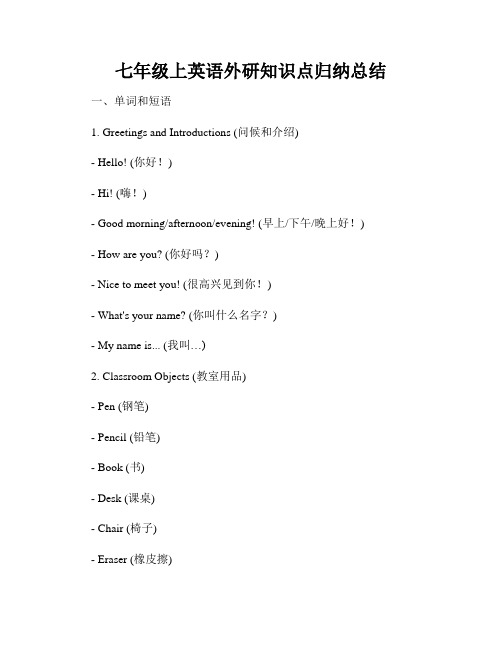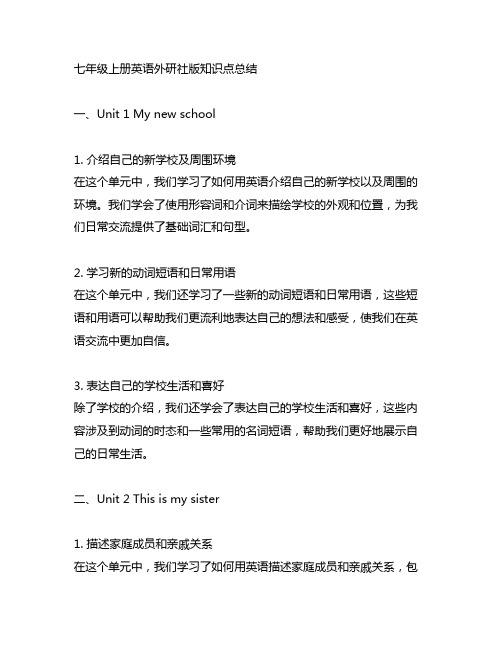英语初一上册知识点外研版
七年级上英语外研知识点归纳总结

七年级上英语外研知识点归纳总结一、单词和短语1. Greetings and Introductions (问候和介绍)- Hello! (你好!)- Hi! (嗨!)- Good morning/afternoon/evening! (早上/下午/晚上好!)- How are you? (你好吗?)- Nice to meet you! (很高兴见到你!)- What's your name? (你叫什么名字?)- My name is... (我叫…)2. Classroom Objects (教室用品)- Pen (钢笔)- Pencil (铅笔)- Book (书)- Desk (课桌)- Chair (椅子)- Eraser (橡皮擦)- Ruler (尺子)- Bag (书包)3. Numbers (数字)- Zero (零)- One (一)- Two (二)- Three (三)- Four (四)- Five (五)- Six (六)- Seven (七)- Eight (八)- Nine (九)- Ten (十)4. Days of the Week (星期) - Monday (星期一)- Tuesday (星期二)- Wednesday (星期三)- Thursday (星期四)- Friday (星期五)- Saturday (星期六)- Sunday (星期日)5. Family Members (家庭成员) - Mother (妈妈)- Father (爸爸)- Brother (哥哥/弟弟)- Sister (姐姐/妹妹)6. Colors (颜色)- Red (红色)- Blue (蓝色)- Yellow (黄色)- Green (绿色)- Orange (橙色)- Purple (紫色)- Black (黑色)- White (白色)二、语法知识点1. 一般现在时- 表示经常性或习惯性的动作或状态。
外研版七年级英语上册全部知识点

外研版七年级英语上册全部知识点外研版七年级英语上册全部知识点一、知识点概述本册书共有12个单元,每单元都有一个主题,如问候、家庭、学校生活、购物等。
每个单元都包含听说读写四个方面的练习,帮助学生全面提升英语能力。
二、知识点详解1、Unit 1:问候与告别1、常用问候语:Hello, Hi, Good morning, Goodbye等。
2、自我介绍:I’m ...,My name’s ...等。
3、询问姓名:What’s your name? Can you tell me your name?等。
2、Unit 2:家庭与朋友1、家庭成员:father, mother, brother, sister等。
2、描述人物特征:She’s ... years old. She has ... hair.等。
3、描述友谊:We’re friends. We like to ...等。
3、Unit 3:学校与课程1、校园设施:library, playground, classroom等。
2、课程名称:English, Maths, Science等。
3、时间表述:It’s ... o’clock. We have ... at ... o’clock.等。
4、Unit 4:食物与饮食1、食物分类:fruit, vegetables, meat, dairy等。
2、饮食习惯:I like to eat ... I don’t like ...等。
3、餐厅用语:Can I have ...? What would you like to eat/drink?等。
5、Unit 5:购物与交易1、商品价格:It costs ...,They sell ... for ...等。
2、购物用语:Can I help you? I want to buy ...等。
3、交易过程:Here’s the change. Thank you.等。
Starter知识点 2024-2025学年新外研版英语七年级上册

新外研社七上知识点sb.=somebody 某人 sth.= something 某事;某物 sp.=someplace 某地do代表动词原形 doing代表动词ing形式 to do为动词不定式did 代表动词过去式Starter要掌握的重点内容:名词、数词、冠词、一般将来时、一般过去时、并列连词and/but/or、基本句型1.welcome to + sp.(某地)欢迎来到某地2. a new stage of ... ...的新舞台/阶段learn new subjects 学习新科目3.learn to do sth. 学会做某事learn from sb. 向某人学习learn about sth. 了解某事/某物4.make friends with sb. 和某人交朋友5.be ready for sth. =prepare for sth. 为某事做好准备be ready to do sth. =prepare to do sth. 准备好做某事get prepared = get ready 做好准备6.forget to do sth. 忘记去做某事forget doing sth. 忘记做过某事7.Moral Education and Law 道德与法治education n. 教育→educational adj. 有教育意义的law n. 法律→ lawyer n. 律师rmation Technology 信息技术information 不可数science technology 科学技术9.sports trousers 运动裤 sports jacket 运动夹克sweater 毛衣 coat 外套;大衣 shirt 男士衬衫 blouse 女士衬衫skirt 短裙 dress 连衣裙 school uniform 校服shorts 短裤 pants 裤子 jeans 牛仔裤10.名词短语:a/an + 形容词 +可数名词单数(a grey jacket)形容词+可数名词复数(black shorts)11.一般将来时(simple future tense)句式:肯定:① sb. will do sth. 某人将会做某事如:I will go to junior high school tomorrow.② sb. am/is/are going to do sth. 某人打算去做某事如:He is going to wear a shirt.否定:① will not=won't如:I won't go to junior high school tomorrow.② am/is/are not going to =am not/isn’t/aren’t going to如:He isn’t going to wear a shirt.疑问:① will sb. do sth如:Will you go to junior high school tomorrow?What will you do tomorrow?② am/is/are sb. going to do sth.如:Is he going to wear a shirt?What is he going to wear?表示将来的判定词:tomorrow 明天、the day after tomorrow 后天、tonight/this evening 在今晚、in the future 在未来next year/week/... 明年/下周/下个...in two days/...(时间段) 两天后/...(时间段)后 ...12.有某物在某个地方的表达方式:There is + a/an+可数单数名词 (+介词短语).There is some +不可数名词 (+介词短语).There are some +可数复数名词 (+介词短语).There is a playground in my school. 有一个操场在我的学校里。
外研版英语七年级上册知识点总结

Module1 My classmates 我的同班同学 1. be from = e from 来自问某人来自哪里,用疑问词where ,结构为: ①Where +be +主语+from ? 答语:主语+be+from+地点. 例:Where is Lucy from? She is from America.露西来自哪儿?她来自美国。
② Where+助动词do/does+主语+e from?例:Where does Tony e from? He es from England.托尼来自哪里?他来自英国。
如:I am from China. = I e from China.Where are you from? = Where do you e from? 2. ---What's your name? ---My name is Tom. = I'm Tom. 问某人的姓名用疑问词what, 结构为:What+be+形容词性物主代词/名词的所有格+name? 答语: ①形容词性物主代词/名词的所有格+name+be+姓名。
②人称代词主格+be+姓名。
例:What is your father's name? 你父亲叫什么名字? My father's name is Black Smith. 我父亲叫布莱克·史密斯。
也可以回答为: He is Black Smith. 他叫布莱克·史密斯。
3. ---How old are you? ---I'm 15 years old. 问某人的年龄用how old ,结构为:How old+be+主语? 答语: 主语(人称代词主格)+be+基数词+ (years old)可省略.例: How old is Linging? She is thirteen (years old). 玲玲多大了?她十三岁。
新版外研版七年级(上册)英语知识点解析

新版外研版七年级(上册)英语知识点解析本文是对新版外研版七年级(上册)英语课程内容进行的知识点解析,旨在帮助学生更好地掌握英语知识。
语法知识点1. 祈使句祈使句是表达命令、请求、劝告等意义的句子,通常用动词原形作谓语。
例如:- Sit down.- Don't be late.- Study hard.2. 一般现在时一般现在时表示现在经常、惯性的动作或者真理等。
一般现在时的肯定句结构为:主语 + 动词原形(第三人称单数要加-s)。
例如:- She often takes a bus to school.词汇知识点1. 数词数词用来表示数字、数量的词汇。
例如:- one, two, three, four- first, second, third, fourth2. 物品名称研究物品的名称可以帮助我们更好地了解和描述身边的事物。
例如:- pencil, eraser, ruler, book- desk, chair, blackboard, whiteboard交际知识点1. 问路当需要问路时,我们可以使用以下语句:- Excuse me, where is the nearest post office?- Can you tell me how to get to the library?2. 自我介绍自我介绍时,我们可以使用以下语句:- Hello/Hi, my name is ___. I am ___ years old.本文总结了新版外研版七年级(上册)英语课程中的相关语法、词汇、交际知识点,帮助学生更好地掌握英语知识,提高英语水平。
2024外研版英语七年级上册复习知识点汇总

七年级上Revision of Starter 一、重点短语sit down坐下stand up站起来how old多大after school/class放学后/下课后listen to music听音乐welcome to+地点欢迎来某地in English用英语say that again再说一遍of course当然what color什么颜色eve,yday life每天的生活good idea好主意how many/how much多少thank you/thanks谢谢put up sb's hand举起某人的手telephone number电话号码write it on the blackboard把它写在黑板上play basketball/football打篮球/踢足球in Class Five Grade One在一年级五班see you tomorrow明天见go swimming去游泳m+国家/城市等在国家/城市等at+车站/学校/家等在车站/学校/家等sb's favorite sport/color某人最喜欢的运动/颜色good morning/afternoon/evening早上好/下午好/晚上好二、重点句型l---\邓at's your name, please? 请问你叫什么名字?---I'm/My mane's... 我叫.2.---How are you ? 你好吗?---F ine,thanks.很好,谢谢……..in spring/summer/autumn/winter在春/夏/秋/冬等3.---This is my friend/teacher, and his/her name is/he is...这是我的朋友/老师,他的名字是.4.---I t's time to go now. Goodbye.现在该走了,再见。
七年级上册英语外研社版知识点总结

七年级上册英语外研社版知识点总结一、Unit 1 My new school1. 介绍自己的新学校及周围环境在这个单元中,我们学习了如何用英语介绍自己的新学校以及周围的环境。
我们学会了使用形容词和介词来描绘学校的外观和位置,为我们日常交流提供了基础词汇和句型。
2. 学习新的动词短语和日常用语在这个单元中,我们还学习了一些新的动词短语和日常用语,这些短语和用语可以帮助我们更流利地表达自己的想法和感受,使我们在英语交流中更加自信。
3. 表达自己的学校生活和喜好除了学校的介绍,我们还学会了表达自己的学校生活和喜好,这些内容涉及到动词的时态和一些常用的名词短语,帮助我们更好地展示自己的日常生活。
二、Unit 2 This is my sister1. 描述家庭成员和亲戚关系在这个单元中,我们学习了如何用英语描述家庭成员和亲戚关系,包括使用人称代词和家庭成员的称呼,让我们能够更好地向别人介绍自己的家庭。
2. 表达自己的爱好和特长我们还学习了如何用英语表达自己的爱好和特长,这些内容涉及到一些常见的动词和名词,为我们展示自己的个性提供了更多的表达方式。
3. 学习新的动词和形容词在这个单元中,我们也学习了一些新的动词和形容词,这些词汇可以帮助我们更准确地描述自己和家人,让我们的表达更加生动和有趣。
三、Unit 3 Is this your pencil?1. 学习和巩固物品的名称在这个单元中,我们学习了一些日常用品的英文名称,包括文具、衣物等,这些词汇是我们日常生活中必不可少的,掌握了这些词汇可以让我们在购物和交流中更加得心应手。
2. 学习特殊疑问句除了学习物品的名称,我们还学习了如何用特殊疑问句来询问别人是否拥有某样物品,这也为我们以后的交流提供了更多的句型结构。
3. 学习并掌握新的介词和代词在这个单元中,我们还学习了一些新的介词和代词,这些词汇的掌握可以让我们更准确地描述物品的位置和归属,提高我们的口语表达能力。
七年级上册英语外研版重点单词和句型

七年级上册英语外研版重点单词和句型一、单词部分1. school (n.) 学校2. teacher (n.) 老师3. student (n.) 学生4. book (n.) 书5. pen (n.) 钢笔6. desk (n.) 课桌7. ch本人r (n.) 椅子8. class (n.) 班级9.puter (n.) 电脑10. wall (n.) 墙11. whiteboard (n.) 白板12. door (n.) 门13. window (n.) 窗户14. blackboard (n.) 黑板15. classroom (n.) 教室16. library (n.) 图书馆17. playground (n.) 操场18. cafeteria (n.) 餐厅19. restroom (n.) 洗手间20. gymnasium (n.) 体育馆二、句型部分1. What's your name? 你叫什么名字?2. My name is Peter. 我叫彼得。
3. How old are you? 你多大了?4. I am twelve years old. 我十二岁。
5. Where are you from? 你来自哪里?6. I am from China. 我来自我国。
7. What do you like? 你喜欢什么?8. I like playing basketball. 我喜欢打篮球。
9. Do you have any brothers or sisters? 你有兄弟姐妹吗?10. Yes, I have a sister. 是的,我有一个妹妹。
11. What subjects do you study at school? 你在学校学什么科目?12. I study Chinese, math, English, and science. 我学中文、数学、英语和科学。
- 1、下载文档前请自行甄别文档内容的完整性,平台不提供额外的编辑、内容补充、找答案等附加服务。
- 2、"仅部分预览"的文档,不可在线预览部分如存在完整性等问题,可反馈申请退款(可完整预览的文档不适用该条件!)。
- 3、如文档侵犯您的权益,请联系客服反馈,我们会尽快为您处理(人工客服工作时间:9:00-18:30)。
中小学教材重点之单元标题
之外研版初中一年级上册
1、 Module one Nice to meet you
重点语法;动词be(am, is, are)说明身份、年龄、状态等。
重点单词;meet, first, English, lesson, class, student, Miss, twelve, year, thi rteen, too, from, close, open, match, write, practice, city, English, English, fourteen, eleven, blackboard, twenty-nine, fifty.
重点句子或句型;
I’m a teacher and I’m Chinese.
He’s my friend.
We’re students.
Are you a new student?
They aren’t English.
2、 Module two Me, my parents and my friends.
重点语法;情态动词can
重点单词;parent, can, basketball, piano, tennis, table tennis, ride, horse, we lcome, international, factory, hotel, university, hospital, office, doctor, wor ker, manager, secretary, at, photo, family, her.
重点句子或句型;
I can play football.
Tony can’t swim.
Can you ride a bike?
Yes, I can. /No, I can’t.
3、 Module three My new school
重点语法;there be
重点单词;there, forty-six, dictionary, library, picture, right, fifteen, sixte en, seventeen, eighteen, nineteen, thirty, sixty, seventy, ninety, gym, science, lab, in front of, next to, behind, some, any, one, building.
重点句子或句型;
Are there any school offices?
Yes, there are. There are some offices.
Is there a computer on Miss Li’s desk?
No, there isn’t.
There aren’t any computers on our desks.
4、 Module four My family
重点语法;have got
重点单词;many, people, aunt, grandfather, grandmother, grandparent, uncle, sis ter, have, have got, grandma, grandpa,email, him, make.
重点句子或句型;
We’ve got a small family.
He hasn’t got any brothers.
Have you got a big family?
Yes, I have./ No, I haven’t.
5、 Module five Healthy food
重点语法;some, any
重点单词;healty, orange, drink, fruit, vegetable, beef, carrot, chicken, juice, melon, milk, onion, pork, potato, tomato, favourite, noodle, candy, Coke, hamb urger, ice cream, fridge.
重点句子或句型;
Have we got any fruit?
Yes, we have. / No, we haven’t.
We’ve got some oranges and some apples.
We haven’t got any melons.
6、 Module six An invitation to the cinema
重点语法;情态动词would
重点单词;cinema, would, film, stadium, match, star, team, evening, Friday, Mon day, Saturday, Sunday, Thursday, Tuesday, Wednesday, with, great, idea, let, le t’s=let us, when, invite, ask, magic, show, day, place, price, theatre, swimmi ng, come, today, plan, playground, stay, game.
重点句子或句型;
Would you like to go to the cinema?
Let’s go in the evening.
It’s at the cinema.
It’s on Sunday.
7、 Module seven My school day
重点语法;行为动词的一般现在时(1)
重点单词;talk, about, What about…? time, o’clock, half, past, art, chemistry,
history, maths, at, star, get up, have, breakfast, house, break, lunch, or, go home, dinner, finish, park, housework.
重点句子或句型;
I talk to my friends.
You have art and history.
They don’t start at eight o’clock.
8、 Module eight Different habits
重点语法;行为动词的一般现在时(2)
重点单词;different, habit, always, card, present, usually, often, never, get, send, OK, ticket, pair, a pair of, trainer, jeans, T-shirt, concert, box, silk, shirt, magazine, CD, choose, lot, lots of, a lot of, clothes, music, singer, i ts, think, think of.
重点句子或句型;
I always listen to music.
She usually wears silks shirts.
We often make a cake for his birthday.
He never plays computer games.
9、Module nine A trip to the zoo
重点语法;行为动词的一般现在时(3)
重点单词;trip, zoo, tiger, camel, elephant, lion, giraffe, monkey, panda, snak e, wolf, guide, thousand, visit, every, animal, zebra, more, Australia, Austral ia, Europe, European, Asia, Asian, here, bamboo, Africa, African, America, Amer ican, desert, forest, jungle, grass, India, leaf, world.
重点句子或句型;
Does the panda come from Chine?
Yes, it does.
Is the kangaroo Australian?
Yes, it is.
10、 Module ten Computers
重点语法;行为动词的一般现在时(4)和序数词
重点单词;keyboard, monitor, mouse, print, printer, connect, switch, switch on, finally, first, use, click, next, save, then, again, travel, download, Internet, grandchildren, sometimes, check, train, timetable, weekend, website, London, i nformation.
重点句子或句型;
What do you usually do on your computer?
How many emails do you send?
Do you often go online?
Do you make travel plans on the Internet?。
